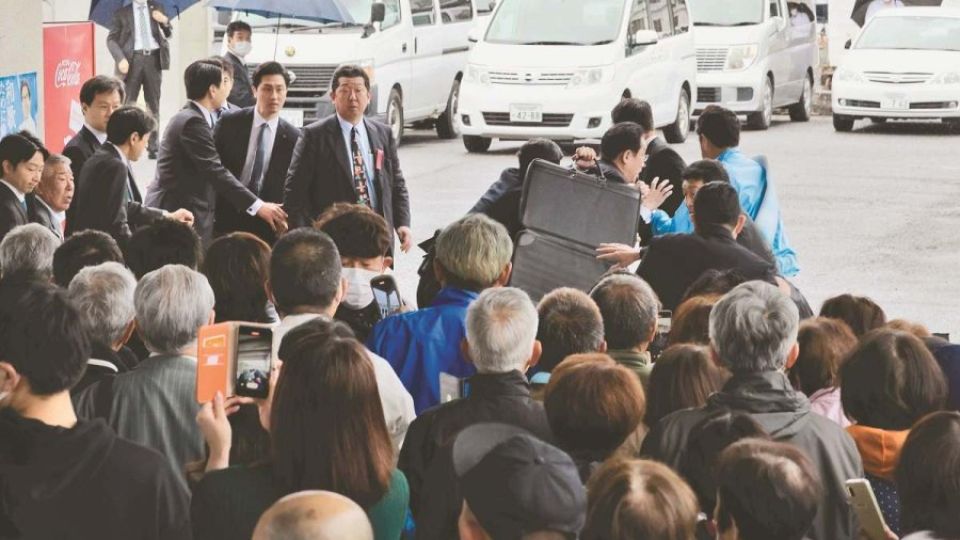April 18, 2023
WAKAYAMA — Saturday’s unsuccessful attack on Prime Minister Fumio Kishida happened during a campaign speech, just like the time former Prime Minister Shinzo Abe was fatally shot in July last year. The latest incident has highlighted the ongoing issues with Japan’s security for dignitaries.
With the G7 summit scheduled for May in Hiroshima, Japan’s VIP protection system must be urgently reviewed.
A cylindrical object was thrown at Kishida at 11:27 a.m. on Saturday at a fishing port in Wakayama. It fell to the ground near him and rolled toward his feet. Protection detail shielded Kishida with a bulletproof briefcase and kicked the object away.
Several other security officers swarmed to Kishida to evacuate him to a safe place.
About 50 seconds after the object was thrown, a loud explosion was heard.
Kishida was unharmed, but police are internally looking at this situation extremely seriously for allowing it to occur.
“I have to say that the police escort failed this time at the point the suspicious object was thrown,” a senior Wakayama prefectural police officer said.
On the day of the event at the port, traffic cones were set up under the roof encircling the audience of about 200 people to separate them from the podium. No baggage inspection was conducted.
The podium was set about five meters from the audience. A number of security officers from the Metropolitan Police Department guarded Kishida at very close range, while prefectural police officers kept a watchful eye on the surrounding area. Uniformed police officers were also stationed nearby. Even so, they were unable to prevent the incident.
The prefectural police will soon examine conditions of their escort on that day.
“We must take the fact seriously that another incident occurred again,” a senior National Police Agency official said.
In response to the shooting of Abe last year, the NPA revised its protection guidelines for the first time in 28 years to overhaul its VIP protection system. The revisions mean the NPA takes the lead in formulating the security plan, which had previously been left to the prefectural police.
In the case of Kishida’s campaign visit in question, the Wakayama prefectural police prepared a protection plan in consultation with the prime minister’s Liberal Democratic Party, and the police escort was conducted based on a procedure that was checked by the NPA.
‘Most difficult task’
A crucial problem with the security arrangements this time is that, as in Abe’s case, the incident occurred during an endorsement speech.
VIP protection in election campaigns is said to be “the most difficult task of all dignitary security,” because politicians are in close proximity to many unspecified people, sometimes shaking hands with audience members. Especially outdoors, as in this case, it is hard to know what kinds of persons might be mixed in with the audience.
The key to protecting dignitaries in such cases is that police officers stop and question suspicious people in the audience without hesitation. It is not known how the suspect in Saturday’s case was behaving before the incident, but a senior MPD official familiar with VIP protection said wondering, “Couldn’t even one of the police officers on the scene have approached the suspect?”
On Saturday, the NPA instructed police nationwide to actively conduct police checkups and security screenings on suspicious people.
Many foreign dignitaries will come to Japan for the G7 Summit next month, and related meetings have already begun.
Security measures at international conferences like the G7 Summit greatly differ from those for election campaigns that involve a large audience in that non-related personnel cannot gain access to dignitaries.
Even so, any incident that threatens the safety of foreign dignitaries will become an international issue.

